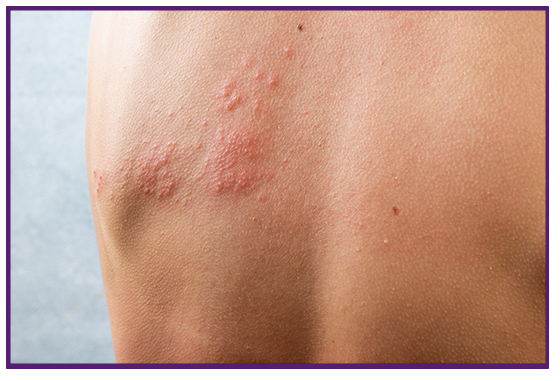You may have heard of shingles and the pain it causes. But what is shingles and what are some of the complications that can arise from this condition? Let’s review shingles, its complications, and what you can do to prevent it.
What Is Shingles?
Shingles is also known as herpes zoster. It is caused by the varicella-zoster virus. This is the same virus that causes chicken pox. Shingles is a reactivation of the chicken pox virus. The virus lays dormant in a part of the nervous system called the dorsal root ganglion. It can lay dormant for decades before reactivating and traveling down a sensory nerve to cause a painful rash. We don’t know exactly why the virus reactivates, but certain risk factors make it more likely. Most patients who have shingles are 50 years or older. Other things that can make you more likely to develop shingles include a weakened immune system, such as HIV or cancer, some medications, and treatments for certain conditions, such as autoimmune disease or cancer.
What Are the Symptoms of Shingles?
Shingles is characterized by a painful rash that happens in a line pattern. When the virus reactivates, it travels down a single nerve distribution. Occasionally, more than one nerve distribution can be involved. Shingles usually has a prodromal syndrome. Before the outbreak of rash, you might have fever, headache, chills, upset stomach, and flu-like symptoms. You may also have some skin sensitivity or burning of the skin before the rash appears. Skin sensitivity can start a few days before the onset of the rash. The flu-like symptoms may start up to a week before the onset of the rash.

The shingles rash is similar to the chicken pox rash in appearance except for its distribution. The chickenpox rash is described as “dew drops on rose petals.” It’s a small blister on a red base that is widespread. The rash of shingles is grouped more closely together along a line. The rash can occur anywhere on the body. In rare cases, the outbreak can occur internally or even sometimes not have a rash with the outbreak. The rash and blisters (vesicles) usually last about 2-6 weeks.
Complications of Shingles
Shingles is more likely to have complications in older patients or immunocompromised patients. The same patients who are more likely to develop shingles are more likely to have complications associated with it. In some people, the rash can become infected with bacteria resulting in the need for antibiotic therapy. Other complications include the involvement of the internal organs or nervous system, resulting in lung, liver, or nerve damage.
Shingles Emergencies
If your shingles rash shows up on your face, it may be an emergency. Shingles of the facial nerves (most commonly the ear or eye) are very serious. Shingles of the eye (ophthalmic shingles or Herpes Zoster Ophthalmicus), can lead to blindness. If the shingles rash shows up on the cheek, forehead, or nose, then you must get treatment immediately. In extreme cases, surgery may be required to help preserve vision. Up to half of patients with ocular involvement will have complications associated with the disease. Mucopurulent conjunctivitis, episcleritis, keratitis and anterior uveitis as well as palsies of the third, fourth, or sixth cranial nerves may happen, which can affect eye movement.
Shingles of the ear (otic shingles or herpes zoster oticus) can result in hearing loss, ringing of the ears, or vertigo. It can also affect your taste or result in dry mouth. In some cases, paralysis of the facial nerves may result. Otic shingles is not as much of an emergency as ophthalmic shingles but still requires rapid treatment.
Postherpetic Neuralgia
Postherpetic neuralgia is a complication of shingles that is associated with chronic pain. It is the most common complication of shingles. About 10-13% of people older than 60 with shingles will get postherpetic neuralgia. It is typically associated with pain that lasts three months or more, extreme sensitivity of the skin, and itching or loss of feeling. The pain may be burning, sharp, or jabbing. In many cases, postherpetic neuralgia will resolve on its own. The pain can be severe, and the pain is usually geared toward treating the pain. In extreme cases, the pain can be disabling, and while it usually resolves on its own, the pain may last indefinitely.
Risk factors for postherpetic neuralgia include age older than 60, severe case of shingles, other underlying medical conditions, location of the shingles, delay in treatment, or not being vaccinated for shingles.
Long-term complications of postherpetic neuralgia include depression, insomnia, fatigue, and decreased appetite. People may also have difficulty concentrating. If narcotics are used to treat pain, then some people may become dependent on pain medication.
Treatment for Shingles
Time is of the essence when it comes to treatment for shingles. There are three goals of treatment for shingles.
- Treat the acute viral infection.
- Treat the acute pain associated with the viral infection.
- Prevent postherpetic neuralgia.
Treatment should be started within 72 hours after the onset of the rash to treat the acute viral infection. After 72 hours, antiviral agents can still be started as long as new lesions are still actively being formed. Once the lesions have crusted then antiviral medications are not as helpful. Antiviral medications include acyclovir, valacyclovir, and famciclovir. The use of antivirals for postherpetic neuralgia prevention is not as clear-cut. Some studies show that there is at least a moderate reduction in postherpetic neuralgia if treatment is started early.
Corticosteroids are frequently used for the treatment of shingles even though the clinical trials aren’t super clear on results. Steroids in combination with antivirals may decrease pain associated with shingles. This is believed to be related to a decrease in nerve inflammation.
Controlling pain is one of the most challenging aspects of managing shingles pain. Pain can be mild and respond to over-the-counter medications or it can be severe and require narcotics. Some topical medications can’t be applied until after the lesions have crusted over.
Ocular herpes is treated with antivirals and corticosteroids, but these patients may also require eye drops and in severe cases surgery to prevent or treat the long-term complications associated with the condition.
Treatment for Postherpetic Neuralgia
Treatment of postherpetic neuralgia is usually geared toward treating pain. Pain is believed to be related to damage to the sensory nerves associated with the virus. Sometimes even light touch can be extremely painful for patients. The pain can be severe enough to interfere with sleep and cause depression. The pain associated with postherpetic neuralgia can be frustrating for patients. Patients don’t always understand why they still have severe symptoms when their rash has resolved.
Different medications have been tried for postherpetic neuralgia. Every patient responds differently to medication, but nothing is reliably used to relieve the pain. It is common for patients to require more than one medication to treat the pain.
Topical medications and over-the-counter medication can be used to try to treat skin sensitivity and pain. Lidocaine and capsaicin can be used to treat skin sensitivity.
Antidepressants are frequently used to help with pain. Usually, tricyclic antidepressants are used to manage the pain. These medications may also help with sleep. If patients can’t tolerate tricyclic antidepressants, selective serotonin (SSRI) and norepinephrine reuptake inhibitors (SNRI) can be used. Some antidepressants include an indication of chronic pain. SSRIs may help more with depression symptoms but aren’t specifically indicated for pain. Treating depression can sometimes help with pain because depression worsens chronic pain and vice versa.
Some seizure medications are used for neuropathic pain as well. Several seizure medications are indicated for neuropathic pain. These medications can affect memory, cause sedation and can affect electrolytes and affect the liver. They can be used in combination with other medications, but this increases the risk of side effects.
Sometimes providers use treatments such as transcutaneous electric nerve stimulation (TENS), biofeedback, and nerve blocks in combination with medication to help with symptoms.
In severe pain cases, narcotic pain medications may be required to help control symptoms. Narcotics may have additional side effects such as constipation, nausea, physiological dependence, psychological dependence, and addiction.
Prevention of Shingles
Two vaccines have been approved for the prevention of shingles. Zostavax was used previously, and many older people may have had this vaccine. In 2017, the Shingrix vaccine was approved for use in the United States. The efficacy of the Shingrix vaccine is so good that the Zostavax vaccine is no longer on the market in the United States. Shingrix is administered in two shots 2-6 months apart. The vaccine is recommended for everyone 50 and older even if they’ve had shingles before. People 19-49 with weakened immune systems also qualify for the vaccine.
The shingles vaccine may not fully prevent shingles but may decrease the severity of the disease and the risk of getting long-term complications from shingles.
Dr. Foglesong Stabile is a board-certified Family Physician who enjoys full scope Family Medicine including obstetrics, women’s health, and endoscopy, as well as caring for children and adults of all ages. She also teaches the family medicine clerkship for Pacific Northwest University of Health Sciences.
References:
https://www.ncbi.nlm.nih.gov/pmc/articles/PMC2664599/
https://www.aafp.org/pubs/afp/issues/2000/0415/p2437.html
https://www.mayoclinic.org/diseases-conditions/shingles/symptoms-causes/syc-20353054
https://www.cdc.gov/shingles/about/symptoms.html
https://eyewiki.aao.org/HerpesZosterOphthalmicus
https://www.ninds.nih.gov/health-information/disorders/herpes-zoster-oticus#:~:text=Herpes%20zoster%20oticus%20is%20caused,%2C%20face%2C%20neck%2C%20and%20scalp
https://www.mayoclinic.org/diseases-conditions/postherpetic-neuralgia/symptoms-causes/syc-20376588
https://www.ncbi.nlm.nih.gov/books/NBK493198/











 Store & manage your medication list
Store & manage your medication list Medication pricing updates
Medication pricing updates Pill & refill reminders
Pill & refill reminders Medication journal & mood log
Medication journal & mood log